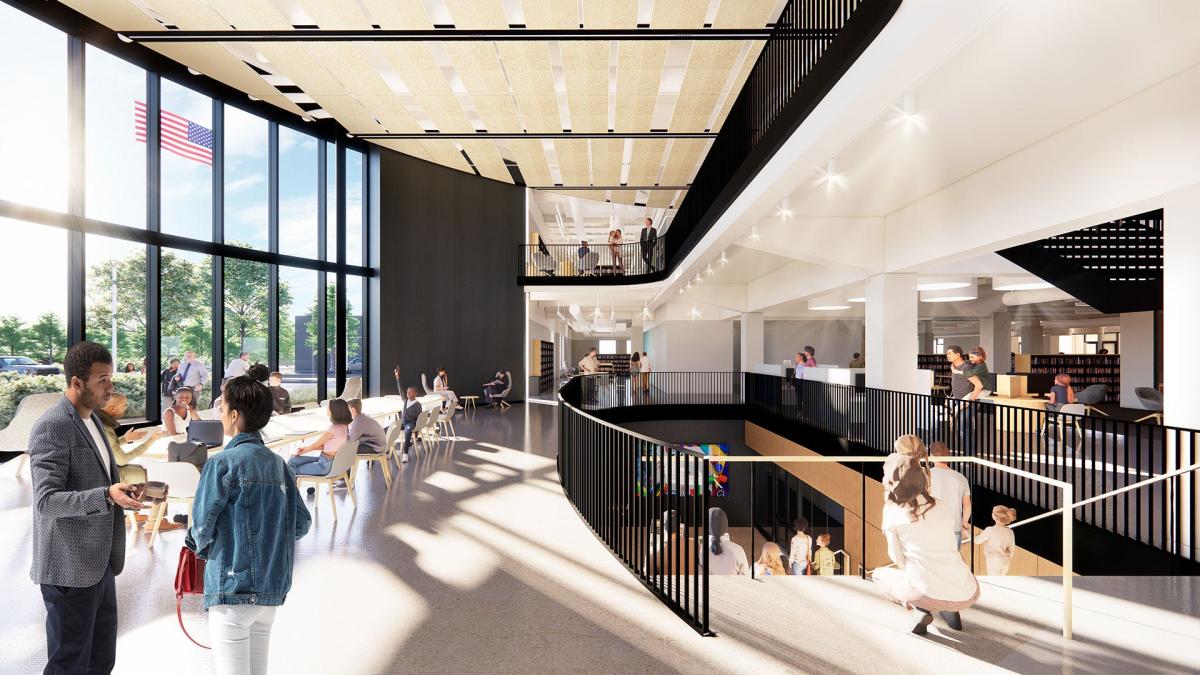APPLETON — How long does it take to build a library in Appleton?
Turns out, it’s nearly 17 years.
No one could have envisioned that 6,059 days would pass from July 15, 2008, when the Library Board first voted to build a new library, to Feb. 15, 2025, when the doors will open on a new $40.4 million library at 200 N. Appleton St., in the city’s downtown.
The library project was slowed by outside forces including the Great Recession of 2008 and its aftermath, the COVID-19 pandemic, supply-chain issues and extraordinarily high inflation rates in the construction industry.
But the project also was plagued by a disconnect between the Library Board and the Common Council. A 2015 plan to build a $37 million library on the downtown bluff occupied by Trinity Lutheran Church and Fox Banquets and Rivertyme Catering was scuttled when the council rejected the purchase of the two properties by an 8-6 vote.
By 2018, a new plan emerged, calling for a $34 million library to be built as part of a housing and retail complex in place of the Soldiers Square parking ramp on Lawrence Street. That plan stalled when the city and U.S. Venture couldn’t agree to terms to construct an underground public parking ramp on the bluff that would have doubled as the foundation of the company’s new corporate headquarters. The construction of the ramp was the first in a series of developments necessary for the library project to proceed.

Appleton Mayor Jake Woodford
In 2020, newly elected Mayor Jake Woodford brought the library project back to life with an announcement that Appleton would build a new library, through renovation or reconstruction, on the existing library site, then known as 225 N. Oneida St.
All the fits and starts likely will be forgotten by library patrons once they experience what the newly renovated and expanded library has to offer: more space, natural light, shorter bookstacks, improved sight lines, creation studios, a flex box for hands-on programming, co-working spaces, a community room for 315 people and a geothermal system for heating and cooling.
To fully appreciate the facility, though, the struggles of the past 17 years cannot be overlooked. The Post-Crescent assembled a timeline of key dates in the library’s 128-year history.
Appleton Public Library timeline
-
1897: The Free Library Association offers to donate materials to the city on the condition that a public library be organized. The Common Council accepts the offer, using the council quarters above the Petersen-Rehbein Meat Market at 106 W. College Ave. to house the library. It opens Sept. 1.
-
1900: Appleton finishes the construction of its first municipal building at 121 S. Oneida St. It contains the library on the first floor and City Hall on the second floor.
-
1921: The library forms a children’s department.
-
1939: City Hall moves out of the municipal building, giving the library additional room.

The Appleton Public Library occupies the building at 121 S. Oneida St.
-
1954: The library is remodeled, allocating space for teens and new formats such as record albums and microfilm.
-
1976: The Outagamie Waupaca Library System (OWLS) is established to share materials, technology and knowledge.
-
1981: A new 74,100-square-foot library opens at 225 N. Oneida St.
-
1996: A $2.3 million project expands the second floor of the library, bringing the building to 86,600 square feet.

The Appleton Public Library at 225 N. Oneida St. shows its age before being replaced with a new building.
-
2008: The Library Board backs a consultant’s recommendation to build a new 138,000-square-foot library in or near the downtown area.
-
2009: Engberg Anderson Architects of Milwaukee develops a conceptual plan for a new 140,000-square-foot library estimated to cost $33 million, plus $7 million to handle parking. No site is identified. The Library Board endorses the plan.
-
2011: Officials pause the pursuit of a new library, citing the effects of the Great Recession.
-
2012: The library launches a community-based planning process to define its mission, vision and strategies for the future.
-
2014: Engberg Anderson Architects, hired to update the 2009 plan, evaluates sites and recommends building a new library on the downtown bluff occupied by Trinity Lutheran Church and Fox Banquets and Rivertyme Catering.

A conceptual drawing from 2014 shows what a new Appleton Public Library would have looked like on the bluff in place of Trinity Lutheran Church and Fox Banquets and Rivertyme Catering.
-
2015: The Common Council rejects the purchase of Trinity Lutheran Church and Fox Banquets and Rivertyme Catering, halting a $37 million library project. Opponents express concerns with the location and price tag.
-
2018: Appleton selects a plan by Commercial Horizons that calls for a new 120,000-square-foot library to be built as part of a housing and retail complex in place of the Soldiers Square parking ramp. The plan later stalls after the city and U.S. Venture can’t agree to terms for a new underground parking ramp on the bluff.

A 2018 architectural rendering depicts the Appleton Public Library as part of a downtown housing and retail complex.
-
March 2020: The global COVID-19 pandemic hits Wisconsin, affecting all facets of life.
-
September 2020: Mayor Jake Woodford announces Appleton will build a new library, through renovation or reconstruction, on the existing library site and not in place of the Soldiers Square parking ramp. Appleton budgets $26.4 million for the project.
-
April 2022: The library closes to prepare for construction. It moves to a temporary site in the former Best Buy store on Kensington Drive.
-
July 2022: Friends of Appleton Public Library launch a campaign to raise $12 million to support the library project, now budgeted to cost $40.4 million. Supply-chain issues and inflation force SOM and Boldt to rethink design elements and materials, delaying the bidding of the project.
-
July 2023: Officials break ground for the new library and announce that Brad Smith, president and vice chair of Microsoft, pledged $3 million toward the $12 million fundraising goal.

Appleton officials toss shovels of sand during a groundbreaking ceremony for the $40.4 million renovation and expansion of the Appleton Public Library.
-
January 2024: The temporary library moves to the former Habitat ReStore at 3000 E. College Ave. after the lease at the former Best Buy store on Kensington Drive expires.
-
January 2025: Appleton officials announce that the new library will open to the public at 9 a.m. Feb. 15.
Sources: Appleton Public Library and The Post-Crescent archives.
Contact Duke Behnke at 920-993-7176 or dbehnke@gannett.com. Follow him on Twitter at @DukeBehnke.
This article originally appeared on Appleton Post-Crescent: Appleton library project overcomes recession, site changes, pandemic

